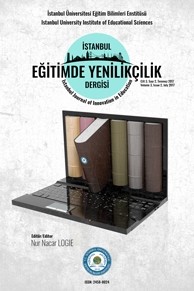Emotional Intelligence, Leadership and Conflict Resolution Tendency of Teachers Effective on School Management
Emotional Intelligence, Leadership and Conflict Resolution Tendency of Teachers Effective on School Management
___
- Bar-On, R. (1997). The Emotional Quotient Inventory (EQ-i): A test of emotional intelligence. Toronto, Canada: Multi-Health Systems, Inc.
- Darling, R. J., Walker, E. W., (2001), Effective Conflict Management: Use of Behavioral Style Model. Leadership & Organization Development Journal, 22 (5), 230-242.
- Eren, E. (1989). Yönetim Psikolojisi. İstanbul: İ.Ü. İşletme Fakültesi Yayınları.
- Gardner, H. (1983). Frames of mind. The theory of multiple intelligences. New York: BasicBooks.
- Goleman, D. (1996). Emotional Intelligence: Why it can be manner more than IQ. London: Bloomsbury Publishing.
- Karip, E. (2010). Çatışma Yönetimi. Ankara: Pegem Akademi.
- Koçel, T. (2003). İşletme Yöneticiliği, Yönetim ve Organizasyon-Organizasyonlarda Davranış Klasik-Modern-Çağdaş Yaklaşımlar. İstanbul: Beta Yayınları.
- Koçel, T. (2007). İşletme Yöneticiliği, Yönetim ve Organizasyon-Organizasyonlarda Davranış-Klasik-Modern-Çağdaş Yaklaşımlar. İstanbul: Beta Yayınları.
- Mayer, D. J., Salovey P. (1993). The Intelligence of Emotional Intelligence. Intelligence.17, 433-442.
- Newsome S., Day, L. A., Catano M. (2000). Assessing the Predictive Validity of Emotional Intelligence. Personality and Individual Differences. 29, 1005-1016.
- Rahım, M. A. (2000). Empirical Studies On Managing Conflict”, The ınternational Journal Of Conflict Management. 11 (1) ,5-8.
- Torndike, E. (1920). Reliability and Significance of Tests of Intelligence. The Journal of Educational Psychology, 9.
- Wilmot, W.W, Hocker, J.L., (2007). Interpersonal Conflict, Newyork. NY: McGraw Hill
- ISSN: 2458-8024
- Başlangıç: 2015
- Yayıncı: İstanbul Üniversitesi
Parental conflict and its association with sibling relationships
Esra İşmen GAZİOĞLU, Ayşegül Kılıçaslan ÇELİKKOL
Enhanced IMS Metadata for Surgical Education Simulators
Nergiz Ercil ÇAĞILTAY, İbrahim CERECİ
Zeliha Özsoy GÜNEŞ, Fatma Gülay KIRBAŞLAR
Burak KİRAS, Behiye BEZİR AKÇAY
Araştırma ve Öğretimde Paralel Derlem Kullanımı: Uppsala Üniversitesi Örneği
Eğitsel Devinim Araştırmalarında Devinimsel Alan Kavramının Gözden Geçirilmesi
Assessing E-learning Readiness of Instructors in Turkey
Sushil.K SHARMA, Sevinç GÜLSEÇEN, Zeki ÖZEN, Elif KARTAL
Akademik Başarı ile Okul İklimi Arasındaki İlişki
Ümit BAHÇETEPE, Filiz MEŞECİ GİORGETTİ
ISO 9126 Değerlendirme Modeli’nin Adapt Framework’e Uygulanması
Alaskar ÖZPERÇİN, Nazlı CİHAN, Nur NACAR-LOGİE, Vakur ÇİFTÇİLİ
